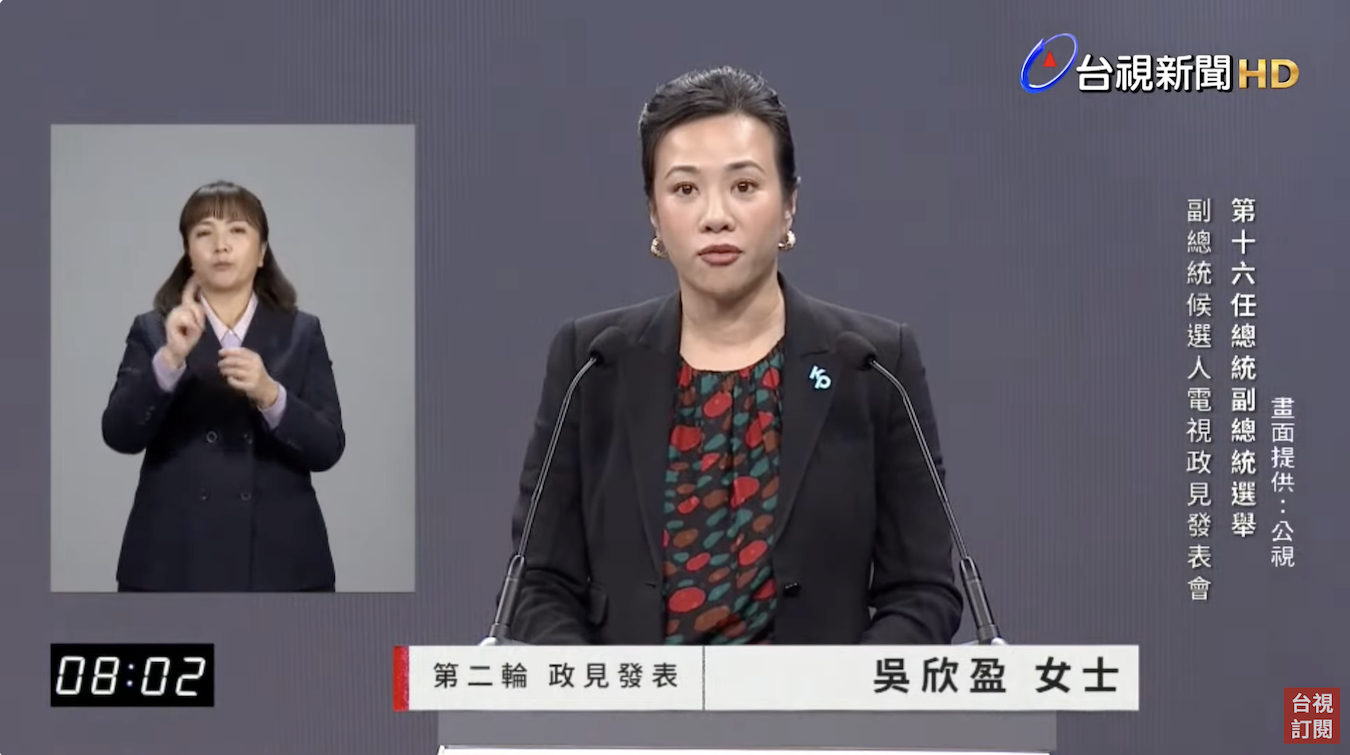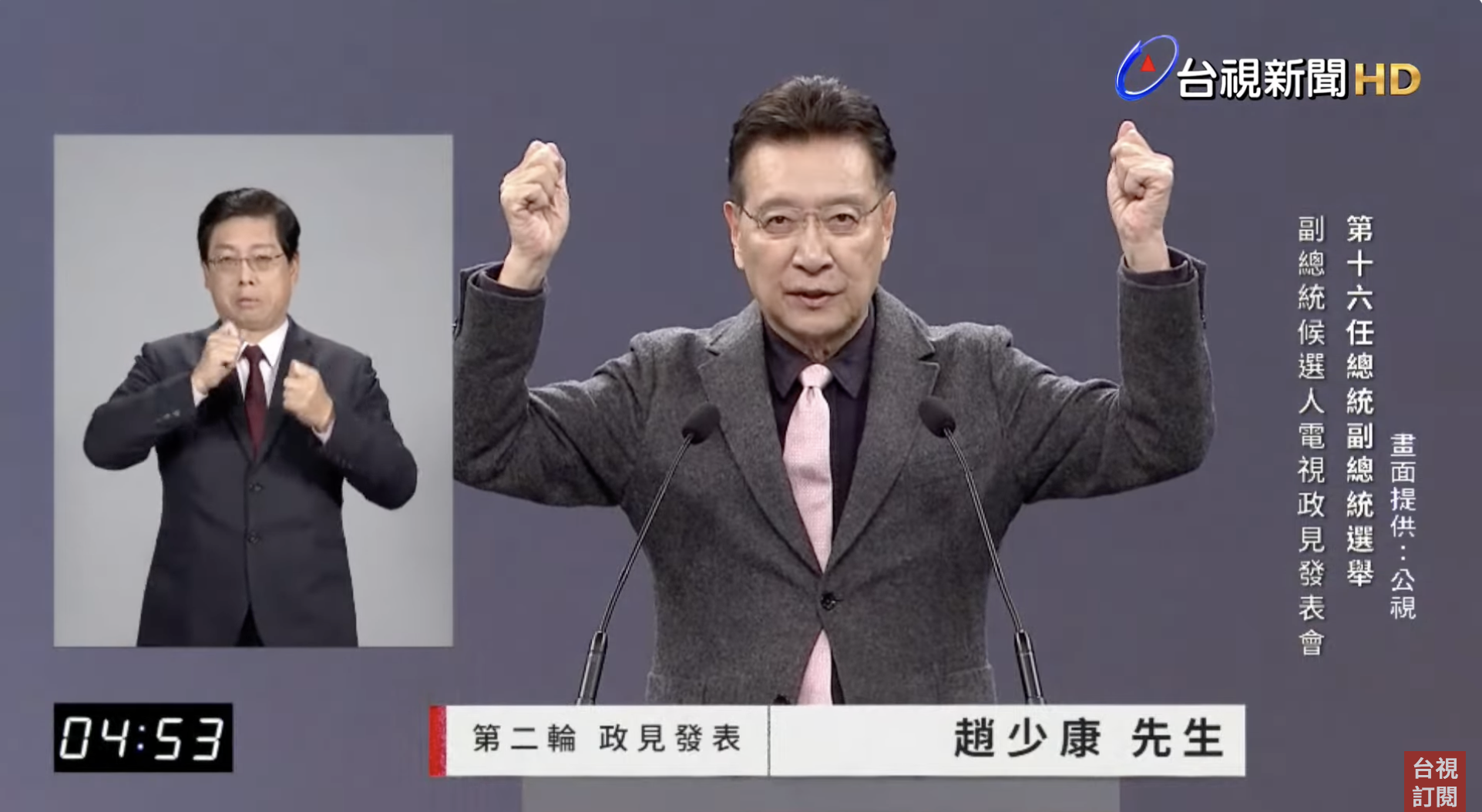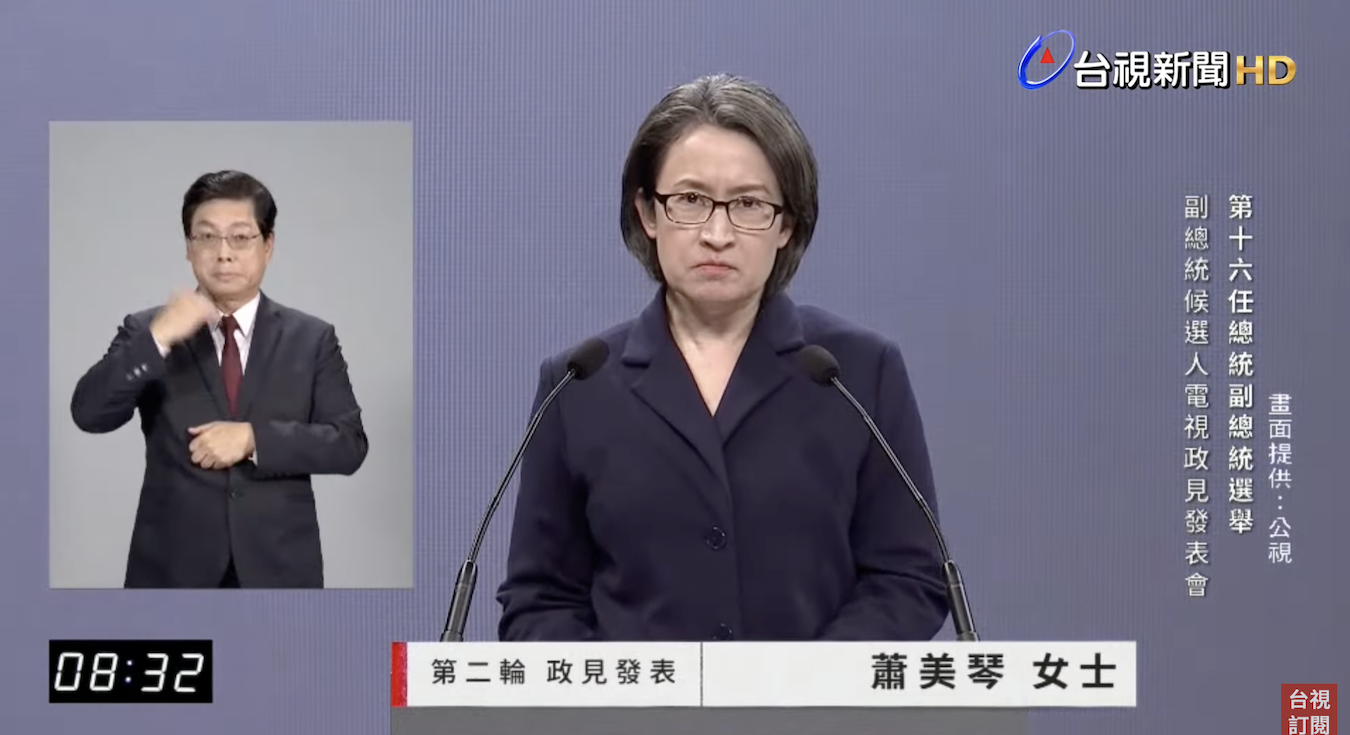by Brian Hioe
語言:
English
Photo Credit: TTV/Screenshot
THE VICE PRESIDENTIAL POLICY presentation took place on December 22nd. Though the format is not a debate, it is often a de facto debate–compared to the first presidential policy platform presentation a few days earlier, it was still more of a debate. The order was Cynthia Wu of the TPP, Jaw Shaw-kong of the KMT, and Hsiao Bikhim of the DPP.
Wu spoke first, then. Wu touted her background as a professional in the US, while stressing the need for international links for Taiwan. Wu suggested that she had accomplished much for Taiwan in expanding international space due to her international connections, pushing for Taiwan’s entrance to international trade agreements. Otherwise, Wu stressed her accomplishments in incorporating innovative technologies into governance, and that Taiwan needed to rely on more than the semiconductor industry and so that the government should develop other industries. Nevertheless, a reference by Wu to her experience working with the alcohol brand Johnny Walker, trying to draw an odd connection to Taiwan walking forward on the path of progress, has been widely mocked online.
 Cynthia Wu. Photo credit: TTV/Screenshot
Cynthia Wu. Photo credit: TTV/Screenshot
Jaw was second. Jaw suggested the DPP’s failures in its years in governance, then attacked properties owned by DPP presidential candidate Lai Ching-te as illegal. Jaw cast doubt on Lai’s promises to donate the land to build a museum for miners, suggesting he had little links to miners today. Jaw stated he would resign as the president of the Broadcasting Corporation of China if Lai actually donated the home. Jaw then went on to attack Lai over his past support of Taiwanese independence, suggesting that the US had arranged for Hsiao Bikhim to be Lai’s vice president to keep an eye on him, calling her his “babysitter”, and referring to Lai as a “terrorist.” However, Jaw closed with a gaffe, accidentally referring to Lai as his “boss.”
Hsiao spoke third. Hsiao emphasized her extensive experience as a legislator and that she was an ROC national, criticizing her opponents for casting doubt on her ROC nationality. Hsiao criticized Jaw for his comments, citing how Jaw claims that the ROC would disintegrate if the DPP took power for decades, but this has not come to be. Hsiao also criticized TPP presidential candidate as mimicking the DPP’s policies, inclusive of on social housing, and claiming that he would pursue a similar foreign policy to Tsai Ing-wen. Hsiao then criticized the KMT for only seeking to rely on the Chinese market in terms of Taiwan’s economic development.
In the second round, Wu again sought to tout policies. This time, Wu began by raising the many fraud cases that take place in Taiwan, and stating that she would improve digital safety for Taiwanese citizens and seek to crack down on fraud. Wu criticized Taiwan’s digital security, given Chinese cyberattacks during US Speaker of the House Nancy Pelosi’s visit to Taiwan, but then went on to call for digital innovations including electronic voting, to avoid issues regarding absentee voting. Otherwise, Wu emphasized the need to improve conditions in Taiwan’s medical conditions.
 Jaw Shaw-kong. Photo credit: TTV/Screenshot
Jaw Shaw-kong. Photo credit: TTV/Screenshot
Jaw continued to attack the DPP in the second round. Jaw first attacked the DPP for its hesitancy on nuclear energy. Jaw criticized Hsiao for drawing on her ROC nationality despite that the DPP was, as he framed it, a pro-independence party–Jaw compared the DPP to the CCP in seeking to denigrate the ROC. Yet Jaw suggested that the DPP was also reliant on China in spite of calling for decoupling from China and criticized Lai’s claims that any of Taiwan’s presidential candidates would be considered pro-independence by China, arguing that only seeking to denigrate the ROC was pro-independence, and bringing up past comments by Hsiao about no longer identifying with the ROC. Jaw stated that the KMT would also be anti-CCP and that the DPP did not understand China, and called for the establishment of a mechanism for military exchanges with China. Lastly, Jaw attacked the DPP regarding the development of Medigen, suggesting issues with Taiwan’s purchase and development of vaccines.
Hsiao avoided responding directly to Jaw’s attacks, but instead stated that Lai’s vision of change was suited to keep pace with changing trends. Hsiao stated that the DPP would take measures to make college more affordable for students and commented on the Tsai administration’s successes in promoting green energy, in line with keeping pace with international trends. Hsiao stated that the DPP was not opposed to dialogue with China, but that the DPP did not have illusions about China either, and brought up the DPP’s opposition to the CSSTA and the KMT’s advocacy for it as indicative of how the KMT has not updated its worldview since ten years prior. Hsiao sought to redirect attention to China’s military threats to Taiwan and framed the DPP as the best choice for peace.
In the last round, Wu stated that digital technologies needed to be incorporated into medical care. Wu called for more spending on medical care, with Taiwan spending less of its GDP on medical care compared to other countries, and stated that measures must be taken to prevent the National Health Insurance from going bankrupt.
Jaw expressed approval of Wu’s comments in his closing, but suggested that such policies were originally proposed by Ma Ying-jeou of the KMT. Jaw returned to the issue of Taiwanese independence to criticize the DPP and suggested the DPP was going against international trends in terms of opposition to nuclear energy, bringing up rates of cancer in Taiwan and Taipower’s fiscal unsustainability. Jaw attacked the DPP over rising inflation in Taiwan, then, suggesting that the DPP was linked to fraud targeting young people. Jaw suggested Taiwan would have war with Lai and Hsiao in charge.
 Hsiao Bikhim. Photo credit: TTV/Screenshot
Hsiao Bikhim. Photo credit: TTV/Screenshot
Lastly, Hsiao criticized the CCP for interfering in Taiwan’s elections so as to amplify social discord. Hsiao sought to remind the public that Tsai’s cross-strait policy was moderate and this is what has led to international support for Taiwan, bringing up vaccine donations from the US as a sign of support, and an accomplishment of the Tsai administration in winning such support. Hsiao criticized US-skeptic discourse as seeking to undermine Taiwan’s international relations, Hsiao stated that the DPP did have some individuals who had perhaps become corrupt, but touted the DPP’s program of reform, and closed on the point of emphasizing progress in Taiwan’s legalization of gay marriage.
In the course of the presentations, Wu was clearly the weakest contender, mostly reading off pre-written statements. By contrast, Jaw’s comments were the opposite extreme, as mostly off-the-cuff. Hsiao struck a balance between responding to the other candidates and prepared points on policy. Still, Hsiao and Wu were more emphatic on their party’s platform, while Jaw talked little of the KMT’s stances and focused on attacks on the DPP. It is probable, then, that the policy presentation will do little to change preconceived views by voters of the three candidates. Either way, one notes that out of the three candidates, only Hsiao did not come out of the debate marked by significant gaffes.

